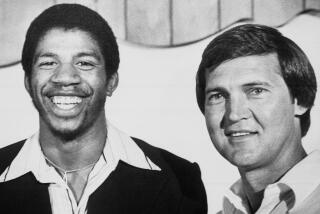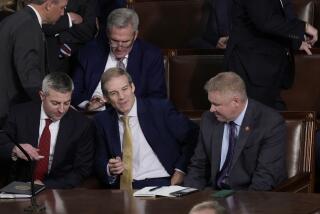Unsentimental Value
- Share via
It’s not just the first step that makes Michael Jordan so effective, it’s his ability to see the double-team coming and escape it. This applies off the court too. Especially off the court.
What Jordan has always done better than most famous persons is move through a crowd, somehow sliding from Point A to Point B without getting bogged down. He can acknowledge you and vacate you at the same time. He looks at you and reaches out to shake your hand, but by the time he does he’s already past you, simultaneously granting an audience while moving on to the next subject. Too smooth to get surrounded.
He’s in that same mode in the final 11 regular-season games of his playing career, which comes here one last time for a game against the Lakers tonight.
He strides through NBA arenas as if they’re hotel lobbies. A wave, a few jumpers, then he’s done. It’s about the destination, not the journey. His eyes are already on his next stop, when he hangs up his Washington Wizard jersey and returns to their front office.
“There’s no sentimental things for me right now,” Jordan said this week. “I’m going to have memories no matter how you look at it. I can’t think about all the memories while I’m trying to play and trying to do my job.”
There are no ceremonies and no speeches. Usually there’s a video tribute on an arena’s giant screens, and a long standing ovation when he is introduced in the starting lineup before a game.
He can still draw fans, from the guy who said he spent his “life savings” ($750) on a ticket to the Warrior-Wizard game to billionaires such as filmmaker George Lucas.
The creator of “Star Wars” sat courtside when the Wizards played at Golden State on Sunday. He took his 10-year-old son, who is just getting into basketball. Although Lucas does not attend many games, he went down from Skywalker Ranch to see Jordan because “he’s amazing. Absolutely amazing.”
It didn’t take long for the conversation to turn to “Star Wars,” and Lucas said that while adults might cherish the original trilogy, kids prefer the new “Star Wars” movies. It’s hard to believe that anyone could choose the antics of young Anakin and Jar-Jar Binks over the heroics of Luke, Han and Leia, but perhaps this realization can help prepare us for the not-too-distant day when a Kobe Bryant or a Tracy McGrady is emblematic of the NBA, and Jordan is just a guy who used to play.
There’s already a drop-off from the heyday of Michaelmania, which peaked with the Chicago Bulls’ second three-peat run, from 1995-96 to 1997-98. That’s when throngs of fans ringed their hotels in every city, and camera flashes exploded like a fireworks display every time Jordan shot a free throw.
The difference is, no one asked him to come back for a third go-round. When he first called it quits at age 30 after his third championship in 1993, we felt cheated, denied an opportunity to watch one of the all-time greats in his prime. When he returned in 1995 it was actually heralded with trumpet fanfare on “SportsCenter.”
This time his return announcement was delayed, then tempered by the Sept. 11 terrorist attacks. His last regular-season game, in Philadelphia on April 16, will probably be overshadowed by the war in Iraq.
No doubt, Jordan’s still in demand. Fans hanging over the service tunnel at the Arena in Oakland roared when he walked into sight after the game. More fans waited in the rain in Portland, Ore., hoping to catch a glimpse of him and maybe even an autograph as he walked from the hotel to the team bus. It’s just not as intense as before. If those Bulls were the Beatles, this is a Paul McCartney solo tour.
Jordan’s backup band is of greater interest to him than to his fans. There’s old buddy Charles Oakley, a teammate from his rookie year, back to provide a little toughness when his aging body allows him to take the floor. Jordan called John Bach, an assistant coach under Phil Jackson in Chicago, out of retirement to join Doug Collins’ staff in Washington. Bach was at an art workshop, sketching away in Rockport, Maine, when Jordan called. Bach sounded as if he had no choice.
“When you’re summoned by the archangel, you show up,” he said.
Jordan brought in Patrick Ewing, whom he tormented for so long when Ewing was a New York Knick, as another assistant coach.
“For years I’ve been fighting against him,” Ewing said. “Now I’m fighting with him.”
It’s almost as if Jordan needs the companionship of friends more than he needs the adulation of fans. If the sun is setting on his career, he’s going to sit on the stoop with the fellas and watch it go down.
That was the scene after the team worked out at the Warrior practice facility in Oakland on Monday. For close to an hour after the balls stopped bouncing and the younger players cleared out of the gym, Jordan sat with his personal trainer, Tim Grover, and Warrior consultant Chris Mullin (who played on the 1984 and 1992 Olympic teams with Jordan) and talked ball.
But in keeping with the non-nostalgia theme, they spent more time talking about the future (such as upcoming draft picks and free agents) than they did recalling the past. Jordan is looking forward to resuming his executive responsibilities and applying the knowledge he gained from his time back on the hardwood.
What’s strangely absent among the Wizards is an abundance of talk about a playoff push. Even though they’re half a game in front of Milwaukee for the eighth spot in the Eastern Conference, it’s as if the postseason isn’t realistic. Wizard insiders say they know this team is done, that it just doesn’t have it.
Even the on-the-record comments indicate an ending, not a continuation.
“As we get ready to finish this season, there’s frustration on his part and mine that we haven’t been able to get better as the season went on,” Collins said. “That’s the one thing that we have not done is, we have not improved. And that’s why we find ourselves where we are today.”
It’s an odd middle ground for Jordan. He doesn’t seem to be gearing up for what was always his finest hour, the playoffs, but he’s in no mood for ceremonies.
“It’s not a tour,” he said.
A reporter recalled how Cal Ripken Jr. made a point of savoring his last time around the baseball circuit and wondered if Jordan was taking the same approach.
“No,” Jordan said. “I’m just sitting in my room, watching a movie or two, getting ready for the game. I don’t get out and move around much -- although I did get out and go to dinner yesterday -- but other than that, I’ve just been trying to enjoy the moment and get myself some rest and get ready for the game.”
Baseball Hall of Famer Joe Morgan joined Jordan for that dinner at a Bay Area restaurant, and Jordan quickly established one ground rule: no shop talk. Basketball and the Wizards are painful topics for him right now. His legendary competitive nature and relentless pressing of teammates have become a lot like his drives to the hoop these days: not quite good enough to get it done anymore.
“Knowing him, knowing how much love he has for the game, there has to be some [frustration],” Morgan said. “It’s frustrating because he’s always been a winner. It’s hard to do what he’s doing.”
Last season the problem was his body, which broke down and caused him to sit out 22 games.
This season, his body has held up, but the inability of his teammates to bring consistent efforts caused him to say, “Mentally, I’m a little shaky right now” about what to expect from them.
The words “mentally” and “shaky” from Jordan? Unheard of.
Jordan said the playoffs “would be a cherry on top.”
He’s trying to define the parameters of success for this comeback, and he’s sticking with some of the same themes he used when he returned.
“The most important thing is for [the younger players] to understand what the attitude about winning is, and the work ethic,” Jordan said. “If we don’t make the playoffs, hopefully that will be passed on to the kids.”
He’s more apt to use the word “job” than he is to use the keyword in the latest Air Jordan campaign: “Love.”
“When you’re playing really good and the team’s in a rhythm, it’s a great love,” Jordan said. “Then, to see a team lose that rhythm, it becomes almost like work. It’s not a fun feeling, no matter how you look at it.”
The numbers are decent enough: 20 points, six rebounds and four assists a game. Not bad for a 40-year-old.
Asked if he felt he had successfully passed on his knowledge and competitive desire to the Wizards, which was supposed to be the real measure of this season, he said: “As much as I could. I feel like I have.”
The games seem to have greater value to his opponents -- some of whom never got to play against Jordan in an NBA game until he came back -- than they do to Jordan.
Even before he went for 37 points against the Wizards, Golden State’s Antawn Jamison said, “It’s probably one of those games you’re going to save on the videotape and put in the library. This is my last game against Michael. I’m not one of those guys that is in awe
It’s possible that Jordan’s presence has made it more difficult for the Wizards to make the playoffs.
“I see other teams play hard against us and then I see them play other teams and roll over,” Wizard guard Jerry Stackhouse said. “Richard Jefferson, he’s matched up against Michael Jordan, he has all types of energy. I see him play against Philadelphia, he’s not even heard of.
“That’s the Jordan effect.”
You see the Jordan effect all over the league, of course, from the dunking silhouette on so many players’ shoes to the new buildings filled with luxury suites.
Only five arenas where Jordan played in his rookie season still are used by NBA teams. Two of them -- Seattle and Oakland -- have been gutted and rebuilt, meaning there are only three buildings that have remained essentially the same for his entire career (even if two of them have changed names).
He was asked to name the three on his way from the shoot-around to the team bus in Portland.
It doesn’t take much to fan Jordan’s competitive flames.
“You know I’m going to get this,” he said.
He nails Madison Square Garden right off. Figures he’d get that one. He scored 38 points there as a rookie in 1984, dropped 55 on the Knicks upon returning from his first retirement in 1995 and said farewell to the Garden with 39 points on March 9.
It doesn’t take him long to guess the Meadowlands, now known as Continental Airlines Arena.
He struggles for the last one, running through cities in his mind, ticking them off with his fingers. He stops in his tracks. He refuses any help or hints. The entire team is waiting on the bus, but nobody’s going anywhere until he figures this out.
Finally, his eyes light up.
“Houston,” he said.
As soon as the last letter crosses his lips, he’s climbing aboard the bus.
He has won again. He’s moved on again.
*
(BEGIN TEXT OF INFOBOX)
There’s No One Like Mike
*--* * NBA experience : 15 seasons * Drafted: by Chicago in the first round (third overall) of the 1984 NBA draft * Championships : 1991, ‘92, ‘93, ‘96, ‘97, ’98 * 1985 rookie of the year, all-rookie team * All-NBA first team : 1987, ‘88, ‘89, ‘90, ‘91, ‘92, ‘93, ‘96, ‘97, ’98 * 1988 NBA defensive player of the year * All-NBA defensive first team: 1988, ‘89, ‘90, ‘91, ‘92, ‘93, ‘96, ‘97, ’98 * NBA MVP: 1988, ‘91, ‘92, ‘96, ’98 * NBA Finals MVP: 1991, ‘92, ‘93, ‘96, ‘97, ’98 * Selected to 14 All-Star games * Ranks first in NBA history in scoring average (30.2 ppg), second in steals (2,499), third in points (32,061), fourth in field goals made (12,093), third in field goals attempted (24,314) and fourth in free throws made (7,297) * Ended the 1997-98 season as the Bulls’ franchise leader in points, rebounds (5,836), assists (5,012), steals, games (930), field goals made and attempted and free throws made and attempted (8,115) * Holds the NBA record for seasons leading the league in scoring (10); shares with Wilt Chamberlain the NBA record for consecutive seasons leading the league in scoring (seven, 1986-87 to 1992-93) * Shares with Karl Malone the NBA record for seasons with 2,000 or more points (11); holds the NBA record for consecutive games scoring in double digits (840) * Holds the NBA record for seasons leading the league in field goals made (10) and attempted (10); led the NBA in steals in 1987-88 (3.16 per game), 1989-90 (2.77) and 1992-93 (2.83) * Upon retiring in 1998, ranked as the all-time NBA Finals leader in three-pointers made (42) and ranked second in three-point attempts (114), third in points (1,176), fourth in steals (62), fifth in field goals made (438), sixth in assists (209) and free throws made (258), seventh in field goals attempted (911) and eighth in free throws attempted (320); holds the NBA playoff record for highest career scoring average (33.4 ppg) * Established an NBA playoff record with 63 points against the Boston Celtics on May 20, 1986; upon retiring in 1998, ranked as NBA playoff leader in field goals attempted (4,497), free throws made (1,463) and attempted (1,766) and steals (376), second in field goals made (2,188), fourth in assists (1,022) and three-point attempts (446) and sixth in three-pointers made (148); recorded two playoff career triple-doubles, both against the New York Knicks (May 9, 1989, and June 2, 1993) * Holds the NBA All-Star game career record for highest scoring average (21.3 ppg) Source: NBA, Washington Wizards
*--*
More to Read
All things Lakers, all the time.
Get all the Lakers news you need in Dan Woike's weekly newsletter.
You may occasionally receive promotional content from the Los Angeles Times.






